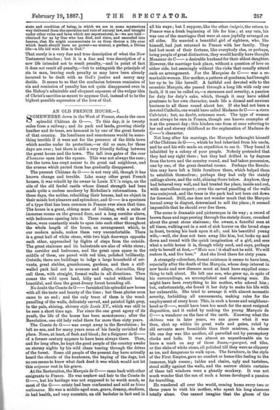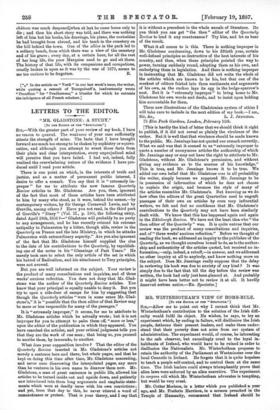AN OLD FRENCH HOUSE.—I.
SOMEWHERE down in the West of France, stands the once splendid Chateau de G—. To this day, it is twenty miles from a railway ; and its park and lands, growing chiefly heather and fir-trees, are hemmed in by one of the great forests of that country. Its loneliness and remoteness would be some- thing terrible if it were not for the presence of the little town which nestles under its protection,—or did so once, for those days are over ; but there is still a very friendly feeling between the great house and the town. The tall iron gates of the cony d'honneur open into the square. This was not always the case ; but the town has crept nearer to its great sad neighbour, and the avenue which parted them has gradually disappeared.
The present Chateau de G— is not very old, though it has known change and trouble. Like many other great French houses, it was rebuilt by its owner in Louis %V.'s reign, on the site of the old feudal castle whose dismal strength had been made quite a useless mockery by Richelieu's reformation,. In these days, the nobles, rebuilding their houses, had no object in their minds but pleasure and splendour, and 0— is a specimen of a type that has been common in France ever since that time. The house is a great, oblong mass of building, with a suite of immense rooms on the ground floor, and a long corridor above, with bedrooms opening into it. These rooms, as well as those below, were constantly made to open into each other throughout the whole length of the house, an arrangement which, to -our modern minds, makes them very uncomfortable. There is a great hall of white stone, with two high doorways opposite each other, approached by flights of steps from the outside. The great staircase and its balustrade are also of white stone ; the corridor and bedrooms, and the great open space in the middle of them, are paved with red tiles, polished brilliantly. Outside, there are buildings to lodge a large household of ser- vants, great stables, greenhouses, gardens, and then a stiff- walled park laid out in avenues and alleys, eharmilles, they call them, with straight, formal walks in all directions. Then tomes the wild open land, hilly and varied without being beautiful, and then the great dreary forest bounding all.
No doubt the Comte de G— furnished his splendid new house with all the taste and beauty of the time ; but these glories soon came to an end ; and the only trace of them is the wood- panelling of the walls, delicately carved, and painted light grey, in the pale, shining, shivery style Louis IV., which was still to be seen a short time ago. For since the one great agony of its youth, the life of the house has been monotonous; after the Revolution, one old lady ruled there for more then sixty years.
The Comte de 0— wae swept away in the Revolution ; he left no son, and for many years none of his family revisited the place. None, at least, of flesh and blood; for a Seigneur de 0— -of a former century appears to have been always there. Then, and for long after, he kept the good people of the country awake on stormy nights by his wild chase tearing through the drives -of the forest. Some old people of the present day have actually heard the shouts of the huntsmen, the baying of the dogs, but no one seems to know what dark deed it was which would not let this seigneur rest in his grave.
At the Restoration, the Marquis de 0— came back with other emigrants to France. He was nephew and heir to the Comte de 0—, but his heritage was not supposed to be worth much, as • most of the G— estate had been confiscated and sold as blew; nationaux. He was a middle-aged man, grave, dreamy, studious, in bad health, and very eccentric, an old bachelor in fact and in
all his ways ; but I suppose, like the other 4ntigris, the return to France was a fresh beginning of life for him ; at any rate, his was one of the marriages that were at once joyfully arranged on all sides. He married a beautiful girl of eighteen, who, like himself, had just returned to France with her family. They had lost most of their fortune, like everybody else, or perhaps, being people of great distinction, they would hardly have thought Monsieur de C— a desirable husband for their eldest daughter. However, the marriage took place, without a question of love on either side, but seemingly without the risks that usually attend such an arrangement. For the Marquise de C— was a re- markable woman. Her mother, a pattern of goodness, had brought her up to • be like herself. A faithful and devoted wife to the eccentric Marquis, she passed through a long life with only one fault, if it can be called so,—a sternness and severity, a passion for duty for duty's sake, which, though it may have added greatness to her own character, made life a dismal and anxious business to all those round about her. If she had not been a devoted Catholic, one would have called Madame de C— a stern Calvinist; but, no doubt, extremes meet. The type of woman must always be rare in France, though one knows examples of it at the present day ; this hinders one from at once referring to her sad and stormy childhood as the explanation of Madame de C—'s character.
Not long after his marriage, the Marquis bethought himself of the Chateau de 0—, which he had inherited from his uncle, and he and his wife made an expedition to see it. They found it inhabited by a colony of poor people. Nobody pretended that they had any right there ; but they had drifted in by degrees from the town and the country round, and had taken possession, one by one, of the great deserted rooms. Perhaps the Revolu- tion may have left a little furniture there, which helped them to establish themselves ; perhaps they had only the stately ceilings above, and the cold, shining floors below. Anyhow, they bad behaved very well, and had treated the place, inside and out, with marvellous respect ; even the carved panelling of the walls was uninjured, and the trees in the park had not been cut down for firewood. Still, one does not wonder much that the Marquis turned away in disgust, determined to sell the place ; it seemed impossible that he should ever live there.
The scene is dramatic and picturesque in its way ; a crowd of brown faces and rags peering through the stately doors, crouched about the great stone staircase; the owner, a fanciful man at all times, walking out in a sort of sick horror on the broad steps in front, turning his back upon it all ; and his beautiful young wife,—well, she does not turn away like him, but looks up and down and round with the quick imagination of a girl, and sees what a noble house it is, though vilely used, and says, perhaps only to herself at first,—" Male non! it shall not be sold. We will restore it, and live here." And she lived there for sixty years.
A strangely colourless, formal existence it seems to have been, especially after the death of the Marquis, whose deep interest in new books and new diseases must at least have supplied some- thing to talk about. He left one son, who grew up, in spite of his surroundings, an accomplished and charming man. He might have been everything to his mother, who adored him ; bat, unfortunately, she found it her duty to make his life with her unbearable. She tried to arrange it with almost monastic severity, forbidding all amusements, making rules for the employment of every hour. This, in such a house and neighbour- hood as 0—, would have been too much for the most resigned disposition, and it ended by making the young Marquis de C— a wanderer on the face of the earth. Knowing what the ehriteau was in later years, we can guess what it was then, shut up within its great walls and gates, ruled by old servants more formidable than their mistress, in whose life one day was like another, all parcelled out by peremptory clocks and bells. It was almost an unpardonable sin to leave a mark on any of those floors,—parquet, red tiles, or fine slabs of white stone, all polished till they were as slippery as ice, and dangerous to walk upon. The furniture, in the style of the First Empire, gave no comfort or home-like feeling to the immense, high rooms ; tables and chairs, ugly and tasteless, stood stiffly against the walls, and the narrow chintz curtains of those tall windows were a ghastly mockery. It was not much wonder that the son of such a house developed a passion for travelling.
He wandered 611 over the world, coming home every two or three years to visit his mother, who spent his long absences totally alone. One cannot imagine that the gloom of the cheiteau was much deepeuedIwhen at last he came home only to die ; and then his short story was told, and there was nothing left of him but his books, his drawings, his piano, the curiosities he bad, brought from abroad, and his tomb in the cemetery on the hill behind the town. One of the allies in the park led to a solitary bench, from which there was a view of the cemetery and of his grave ; every day, at a certain hour, for all the rest of her long life, the poor Marquise used to go and sit there. The history of that life, with its companions and occupations, cruelly broken in upon as it was by the war of 1870, seems to
me too curious to be forgotten. E.



































 Previous page
Previous page